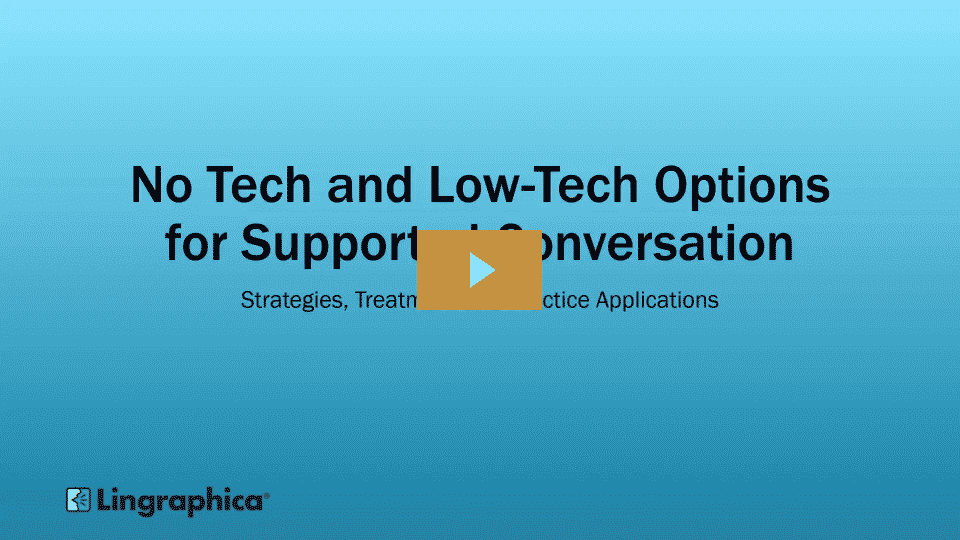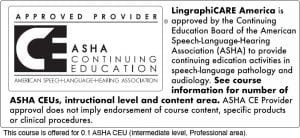 In our new course on no and low-tech options for improving communication, Speech Language Pathologists (SLPs) will learn about resources to improve communication outside of high-tech AAC devices. We’ll explore key aspects, including:
In our new course on no and low-tech options for improving communication, Speech Language Pathologists (SLPs) will learn about resources to improve communication outside of high-tech AAC devices. We’ll explore key aspects, including:
-
- engaging care partners in their loved one’s treatment
- Supported Conversation for Adults with Aphasia (SCA)
- implementing Lingraphica’s family of SmallTalk apps during therapy and treatment
At Lingraphica, we understand that it isn’t enough to provide knowledge and information without also focusing on implementation. We want to provide our SLPs with the tools they need to implement the knowledge they gain. Through our on-demand CEU course, “No Tech to Low-Tech Options for Supported Conversation,” SLPs will become familiar with three different no tech multi-modal therapy strategies. They will also be able to outline simple communication strategies for care partners to use to improve communication with PWAs, as well as learn how Lingraphica’s SmallTalk applications can be used for therapeutic, orthotic, and prosthetic purposes.
This course will provide clinicians with practical application ideas and review obstacles and solutions to improved communication. We will also talk about supported conversation techniques, and strategies and apps designed for communication, conversation, and connection.
Our team works with countless SLPs, care partners, and PWAs to complete thousands of high-tech AAC trials every year. One of the most important things we have discovered is that when we engage care partners in their loved one’s treatment, it leads to better long-term outcomes. We strive to emphasize the critical role care partners play in their loved one’s recovery. Because of this, Lingraphica conducted a broad-reaching survey, which we compiled into the 2020 Aphasia Caregiver Report. By gaining a better understanding of care partners, we are better able to serve our community.
The Supported Conversation for Adults with Aphasia (SCA) approach was developed by the Aphasia Institute. We use this approach to outline ways to implement no and low-tech tools to help PWAs break down communication barriers, improve communication skills, and ultimately feel valued and heard.
In this course we’ll review the basics of SCA application, which include intonation, gesturing and body language, and reduction of external stimuli. We also review ways to support your communication with PWAs, such as eye contact, writing key words and phrases, and using pictures or drawings to share ideas. We will also explore the use of communication boards, which can offer accessible support for improving communication without the use of high-tech AAC.
Promoting Aphasics’ Communication Effectiveness (PACE) is a therapy that engages SLPs and care partners in practicing communication techniques. This therapy technique employs different modes of communication, as well as feedback about which strategies worked best. Once these strategies are learned, they can become a habit. The more people who are able to support the PWA with their communication, the more their communication is going to improve.

Lingraphica’s SmallTalk apps offer picture-based vocabularies of words and phrases to help improve communication. These include the SmallTalk Conversational Phrases, which focus on greetings and commonly used phrases, responses, and requests. We also have our SmallTalk Pain Scale, which allows PWAs to communicate the intensity of pain using descriptions and images from the Wong-Baker Faces Pain Scale. We also offer SmallTalk Frases de Conversación for our Spanish-speaking population.
Finally, we’ll explore successful treatments using our TalkPath Therapy exercises. We offer over 13,500 exercises, including swallowing, oral-motor, speech, and cognition. We also offer a news app, TalkPath News, which offers accessible news stories and incorporates comprehension questions at the end of each article.
No Tech to Low-Tech Options for Supported Conversation
To learn more about getting started with speech teletherapy, watch our free CE course,
“No Tech to Low-Tech Options for Supported Conversation”.




